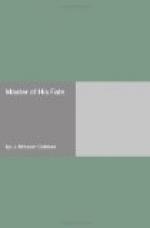“I think,” said he to Jenkins, “I’ll try and have a word with him.”
“Yes, sir,” said Jenkins, and led the way to the study. He tapped at the door, and then turned the handle; but the door remained closed.
“Who is there?” asked a weary voice within, which scarce sounded like the voice of Julius.
“I—Lefevre,” said the doctor, putting Jenkins aside. “May not I come in? I want a friendly word with you.”
“Forgive me, Lefevre,” said the voice, “that I do not let you in. I am very busy at present.”
“You are alone,” said Lefevre, “are you not?”
“Alone,” said Julius; “yes, all alone!” There was a melting note of sadness in the words which went to the doctor’s heart.
“My dear Julius,” said he, “I think I know what’s troubling you. Don’t you think a talk with me might help you?”
“You are very good, Lefevre.” (That was an unusual form of speech to come from Julius.) “I shall come to your house in a few minutes, if you will allow me.”
“Do,” answered Lefevre, for the moment completely satisfied. “Do!” And he turned away.
But when Jenkins had closed the outer door upon him, doubts arose. Ought he not to have insisted on seeing whether Julius was in truth alone in the study? And why could they not have had their talk there as well as in Savile Row? These doubts, however, he thrust down with the promise to himself that, if Julius did not come to him within half an hour, he would return to him. Yet he had not gone many steps before an unworthy suspicion shot up and arrested him: Suppose Julius had got rid of him to have the opportunity of sending a mysterious companion away unseen? But Jenkins had said he had let no one in, and it was shameful to suspect both master and man of lying. Yet Lady Mary Fane had distinctly recognised the man who passed into the Albany courtyard: had he merely passed through on his unceasing pursuit of something unknown? or were father and son somehow aware of each other? Between this and that his mind became a jumble of the wildest conjectures. He imagined many things, but never conceived that which soon showed itself to be the fact.
Chapter IX.
An Apparition and a Confession.
He let himself in with his latch-key, went into his dining-room, and sat down dressed as he was to wait. He listened through minute after minute for the expected step. The window was open (for the midsummer night was warm), and all the sounds of belated and revelling London floated vaguely in the air. Twelve o’clock boomed softly from Westminster, and made the heavy atmosphere drowsily vibrate with the volume of the strokes. The reverberation of the last had scarcely died away when a light, measured footfall made him sit up. It came nearer and nearer, and then, after a moment’s hesitation, sounded on his own doorstep. With that there came the tap of a cane




